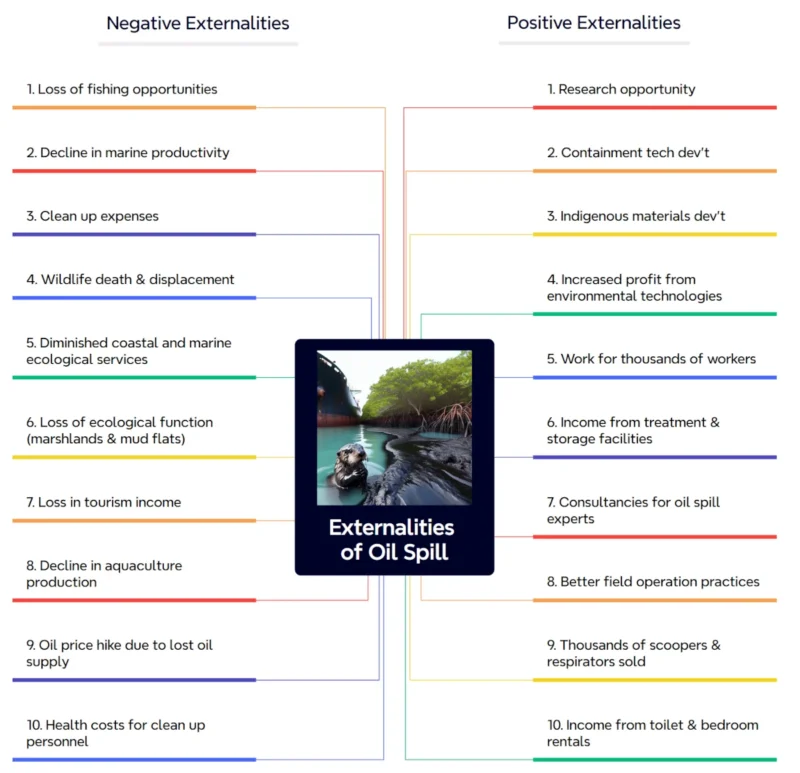
Oil spills are often cited as classic examples of environmental disasters—but from an economic standpoint, they also serve as real-world laboratories for studying externalities, market failures, and the valuation of ecosystem services. Understanding the externalities of oil spill allows scholars and students of environmental economics to explore how costs and benefits ripple through society long after the spill has been contained.
Table of Contents
Introduction
Oil spills are often perceived as purely disastrous events with devastating consequences for the environment and society. However, from an environmental economics perspective, oil spills can have both negative and positive externalities. Understanding these oil spill effects helps students and policymakers evaluate the true costs and benefits that such environmental disasters bring to various sectors.
One notable incident occurred on August 16, 2013, when a cargo vessel collided with a passenger ferry in Cebu, central Philippines. The accident caused the release of thousands of liters of diesel and bunker fuel into the surrounding waters, affecting nearly 5,000 hectares of coastal areas.
Although serious, this event was small compared to major international oil spills, such as the Timor Sea spill (2009) and the Deepwater Horizon disaster in the Gulf of Mexico (2010)—considered the worst environmental disaster in U.S. history, second only to the deliberate Gulf War oil spill of 1991.
Externalities of Oil Spill
In environmental economics, an externality refers to the cost or benefit imposed on third parties who are not directly involved in an activity. Oil spills generate both negative externalities (such as environmental damage and loss of livelihood) and positive externalities (such as job creation in cleanup and research).
While the negative oil spill effects often outweigh the positives, analyzing both sides offers a comprehensive understanding of the broader economic and ecological implications.
10 Negative Externalities of Oil Spills
1. Loss of fishing opportunities
Fisherfolk face immediate loss of income due to restrictions on fishing in contaminated areas and a decrease in fish populations. Communities dependent on fishing may experience increased poverty and uncertainty about future prospects, exacerbating social challenges.
2. Decline in marine productivity
Oil can coat the surface of the water and settle on the seabed, leading to contamination that affects fish habitats such as coral reefs and spawning grounds. The chemicals in oil can be toxic to marine life, reducing fish populations and affecting the species that rely on them as a food source.
As a base of the marine food web, plankton can be severely affected by oil, which reduces the food available for small fish and, subsequently, larger predators. Reduced marine productivity due to disruptions in the food chain can have long-term ecological consequences.
3. Clean up expenses
The government incurs additional costs by deploying ships and aircraft for cleaning efforts. There’s also an opportunity cost tied to these operations due to resource allocation elsewhere.
4. Wildlife death and displacement
The contamination has detrimental effects on marine and coastal wildlife, including fish, birds, turtles, sea snakes, and mammals. The death or migration of certain species due to oil can lead to an imbalance in the ecosystem, further disrupting fishing opportunities.
5. Diminished coastal and marine ecological services
Oil spills can severely impact ecological services, which are the benefits that ecosystems provide to humans. These services include provisioning, regulating, cultural, and supporting services that are essential for human well-being. Oil spills can contaminate fish and other seafood, leading to declines in fish populations and making them unsafe for consumption. This affects the availability of seafood as a key food source.
Mangroves and coastal plants provide materials such as timber and plant fibers. Oil contamination can kill or severely damage these resources, reducing their availability.
Oil-contaminated beaches and waters deters tourists, affecting recreational activities like swimming, diving, and kayaking, and damaging the local tourism industry.
6. Loss of ecological function
Critical ecosystems like mangroves, marshlands, and mudflats lose or diminish their ecological functions, impacting biodiversity.
Mangroves provide essential breeding and nursery habitats for many species of fish, crustaceans, and birds. Further, mangroves are highly efficient at sequestering carbon, playing a crucial role in climate regulation.
Marshlands play a vital role in nutrient cycling, helping decompose organic matter and recycle nutrients back into the ecosystem.
Mudflats support diverse communities of invertebrates, which in turn serve as food for fish and migratory birds.
7. Loss in tourism income
The contamination affects various tourism-related activities such as surfing, beach-going, sports fishing, and SCUBA diving, leading to a loss of income for the tourism industry. With reduced fishing and tourism opportunities, local communities may face economic hardship, leading to potential socio-economic issues.
8. Decline in aquaculture production
Oil spills lead to the contamination of water, introducing toxic compounds that degrade water quality. Contaminated waters lead to a decline in plankton and other small organisms that serve as food for many aquaculture species. This can directly affect the health and growth rates of farmed species like fish, mollusks, and crustaceans. Oil can settle into the sediments in and around aquaculture facilities, leading to contamination that affects benthic organisms, which are often part of aquaculture operations (e.g., mussel and oyster farming).
Oil contains various chemicals, such as polycyclic aromatic hydrocarbons (PAHs), which can be toxic to cultivated species, causing reduced growth, increased mortality, and reproductive issues. The physical presence of oil slicks can damage sensitive larval stages of aquatic organisms, crucial for aquaculture production.
9. Oil price hike due to lost oil supply
Disrupted oil supply can lead to price hikes, affecting broader economic stability. Concerns about potential shortages due to production disruptions can lead to immediate price increases as buyers compete for the limited available supply.
10. Health costs for cleanup personnel
Those involved in cleanup operations may face health challenges, leading to increased medical expenses. Cleanup workers can inhale volatile organic compounds (VOCs) and other toxic fumes released from crude oil, which may cause respiratory issues and other systemic health effects. Direct skin contact with oil and dispersants can lead to skin irritation, rashes, and chemical burns.
10 Positive Externalities of Oil Spills
1. Research opportunity
Universities play a crucial role in studying water toxicity, pollution, and ecosystem recovery by conducting cutting-edge research to understand the impacts of contaminants on aquatic environments. They also develop innovative solutions and technologies to monitor and mitigate pollution while educating the next generation of scientists and policymakers to implement sustainable practices for ecosystem restoration. These events trigger more engagement in research and development activities.
2. Development of oil spill containment technologies
Environmental technology industries can leverage oil spills as opportunities to develop and refine innovative containment and cleanup solutions, such as advanced booms, skimmers, and bioremediation techniques. By meeting the urgent demands for effective spill response, these industries not only drive technological advancements but also position themselves as leaders in sustainable environmental management.
3. Use of indigenous materials in containing oil spills
In the aftermath of oil spills, there is often a heightened demand for natural and locally-sourced materials, such as coconut husks and human hair, which can be effective in absorbing oil. This creates economic opportunities for local communities, as these materials can be harvested or collected and sold as eco-friendly solutions to aid in spill cleanup.
Additionally, engaging the local population in these efforts not only provides immediate financial benefits but also fosters community involvement in environmental restoration, enhancing awareness and resilience against future events.
4. Increased profit from environmental technologies
The demand for environmental technologies surges following an oil spill, as both governmental bodies and private sectors seek immediate and effective solutions to mitigate ecological damage. Companies specializing in cleanup technologies such as oil skimmers, bioremediation agents, and containment booms can capitalize on this urgent need, leading to increased sales and market growth benefitting distributors and businesses. Furthermore, the innovation driven by this demand enhances the industry’s capability to develop more efficient and cost-effective technologies.
5. Job for thousands of workers
Oil spills create a significant demand for labor as large teams are needed for containment and cleanup efforts, providing job opportunities for thousands of workers, particularly in affected regions. These jobs not only offer immediate employment and income for local populations but also provide valuable experience and training in environmental management and disaster response. Additionally, involvement in such efforts can lead to long-term career development opportunities within environmental services, contributing to workforce development and economic growth in impacted communities.
6. Income from treatment and storage facilities
Oil spills generate increased demand for treatment and storage facilities to manage and process the contaminated water and oil waste, creating a lucrative opportunity for businesses in these sectors. For example, treatment companies with the capacity to handle hazardous waste can gain substantial contracts as they provide essential treatment and storage services, thereby securing a steady stream of revenue during cleanup operations.
7. Consultancies for oil spill experts
Oil spill experts benefit from spills through increased demand for their specialized knowledge and skills, as they are called upon to lead and advise on containment, cleanup, and environmental restoration efforts. These scenarios provide opportunities to apply their expertise in real-world situations, enhancing their professional reputation, expanding their networks, and potentially leading to higher compensation and consulting opportunities.
8. Better field operation practices
Oil spill incidents serve as critical learning opportunities, driving improvements in field operation practices by highlighting weaknesses in existing response strategies and prompting the development of more effective protocols. Through post-incident reviews and research, best practices are refined, incorporating new technologies and methodologies that enhance response speed, efficiency, and safety.
Additionally, these incidents often lead to increased training and preparedness among response teams, ensuring that future operations are conducted with greater precision and coordination.
9. Income from thousands of scoopers and respirators sold
Oil spills significantly boost the demand for specialized equipment such as scoopers and respirators, as effective containment and cleanup require robust tools and safety measures to protect workers. Scoop equipment is essential for physically removing oil from water surfaces, driving sales as organizations replenish and upgrade their stock for enhanced efficiency. Similarly, respirators become critical for safeguarding response teams against harmful fumes and chemicals, leading to an uptick in sales as safety regulations and health concerns drive the adoption of high-quality protective gear.
10. Income from toilet and bedroom rentals
During an oil spill, companies involved in the cleanup operations often require temporary accommodations for their workers, leading to increased demand for local lodging, such as rented toilets and bedrooms. This surge creates opportunities for local businesses and property owners to benefit economically by providing essential services and amenities to these workers, who may be on-site for extended periods.
Additionally, the influx of personnel can stimulate other local businesses, such as restaurants and grocery stores, further boosting the local economy during the cleanup efforts.
Conclusion
The effects of oil spills span environmental, economic, and social dimensions. While some sectors may benefit temporarily, the long-term environmental damage often outweighs short-term gains. Oil spills degrade ecosystems that provide essential life-support services—resources that are ultimately irreplaceable and invaluable.
A balanced view of both positive and negative externalities enables policymakers, researchers, and students to value environmental impacts objectively and design better strategies to prevent or mitigate future oil spill disasters.
References
1. Rappler. (2013, August 19). Oil spill: Cebu under state of calamity. Retrieved August 29, 2013, from http://www.rappler.com/nation/36787-oil-spill-cebu-under-state-of-calamity
2. Al Jazeera. (2009, October 30). Timor sea oil leak continues. Retrieved August 29, 2013, from http://www.aljazeera.com/news/asia-pacific/2009/10/200910307564274566.html
3. Arup, T. (2009, November 3). (2009, November 3). Mud to be used to stop oil rig fire today. In The Sydney Morning Herald. Retrieved August 29, 2013, from http://www.smh.com.au/environment/mud-to-be-used-to-stop-oil-rig-fire-today-20091102-htfp.html
4. Dell’Amore, C. (2010, May 13). Gulf oil leaks could gush for years. In National Geographic Daily News. Retrieved August 29, 2013, from http://news.nationalgeographic.com/news/2010/05/100513-science-environment-gulf-oil-spill-cap-leak/
5. BBC News. (2010, May 30). Gulf of Mexico oil leak ‘worst US environment disaster.’ Retrieved August 29, 2013, from http://www.bbc.co.uk/news/1019433
FAQ: Externalities of Oil Spill: 10 Positive and 10 Negative Effects
1. What are the main effects of oil spills on the environment?
Oil spills damage marine ecosystems by contaminating water, killing wildlife, and destroying habitats like mangroves and coral reefs.
2. Can oil spills have any positive effects?
While mostly harmful, oil spills can lead to increased research, technological innovation, and temporary job creation in cleanup and restoration activities.
3. How do oil spills affect the economy?
Oil spills cause huge financial losses in fishing and tourism but may create short-term economic activity in cleanup operations and related industries.
4. Why are oil spills considered a negative externality?
They impose environmental and social costs on people who were not involved in the activity that caused the spill, such as local communities and taxpayers.
5. How long do the effects of an oil spill last?
The environmental impact can persist for years or even decades, depending on the scale of the spill and the resilience of the affected ecosystem.



